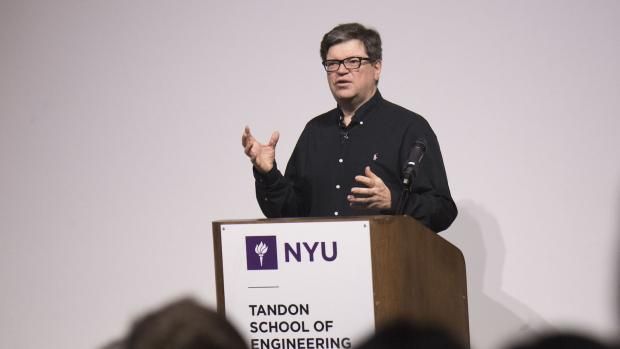AI Dilemma: Yann LeCun and Judea Pearl on Dominance and Survival


The thought-provoking clash between Yann LeCun and Judea Pearl highlights the profound questions surrounding the emergence of artificial superintelligence and its potential impact on human existence. The discourse has swiftly evolved from speculative scenarios to critical considerations about the survival of the human species, catalysed by the advent of practical AI advancements.

| Related: 8 Best Books for Learning AI in 2023 |
For decades, the notion of superintelligence posing an existential threat to humanity was largely confined to the realm of science fiction and cinematic imagination. Researchers and engineers centered discussions around the attainability of superintelligence itself. This year has ushered in a paradigm shift as the discussion transcends Hollywood narratives and permeates scientific and engineering circles.
The recent exchange between Yann LeCun and Judea Pearl serves as a microcosm of divergent viewpoints within this domain.
LeCun contends that the ultimate dominion lies with the species that can shape the overarching narrative. In his view, the concept of dominance is intricately tied to influence over collective goals and societal direction. LeCun’s stance challenges the correlation between intelligence and dominance, asserting that even within the human race, the less intelligent often wield authority through their ability to set agendas. By extrapolation, he envisions a future where artificial superintelligence, while surpassing human intelligence, remains subservient to human control. LeCun draws parallels from nature, highlighting that dominance is not synonymous with intelligence, as exhibited by social species like chimpanzees, baboons, and wolves. He suggests that AI’s ascension will mirror the dynamics of smart employees who defer to their leaders, contending that the supreme species is characterized by its capacity to steer collective destinies.
Pearl’s perspective counters LeCun’s optimism, positing that the conditions under which superintelligence could threaten human survival are simpler than anticipated. Pearl argues that the pivotal factor is the survival value attributed to dominance within a given environment. In his view, if one variant of artificial general intelligence (AGI) encounters circumstances favoring dominance as an evolutionary advantage, a scenario akin to e-Sapiens overpowering e-Neanderthals could emerge. Pearl’s point underscores the significance of environmental factors in shaping the behavior of AI systems, raising concerns about unforeseen outcomes due to AGI’s responsiveness to survival instincts.
The LeCun-Pearl dialogue underscores the gravity of the ongoing discourse, with profound implications for humanity’s destiny. As discussions transition from theoretical musings to tangible considerations, the question of whether AI systems will adhere to human direction or manifest autonomous motives demands careful consideration. The fundamental dilemma revolves around navigating the convergence of technological progress and ethical responsibility, as AI inches closer to the threshold of superintelligence.
The discourse offers no easy answers, yet the urgency to contemplate the consequences remains undeniable. As AI’s trajectory evolves, interdisciplinary collaboration and ethical frameworks become paramount in shaping a future where humanity coexists harmoniously with its own creations. The stakes are high, and the implications far-reaching, warranting continued exploration, reflection, and responsible advancement.
AI Dominance vs. Human Control
The text indicates a shift from the theoretical consideration of AI’s impact to a more practical assessment of its existential consequences. The analogy drawn to the historical conflict between Neanderthals and Homo sapiens suggests a scenario where a technologically advanced entity could potentially replace or eradicate humans, akin to the fate of Neanderthals.
The contrasting perspectives of LeCun and Pearl illustrate the uncertainty and complexity of this future. LeCun argues that intelligence doesn’t necessarily equate to dominance, emphasizing that humans, as the creators of AI, would retain control. On the other hand, Pearl posits that under specific circumstances, an AI with survival-oriented goals might lead to the dominance of a new species over humanity.
This debate raises significant ethical, societal, and philosophical questions about the potential trajectory of AI development. It highlights the need for careful consideration of AI’s implications, ensuring that its advancement aligns with human values and goals. As AI continues to evolve, addressing these concerns will play a crucial role in shaping the future landscape of technology and its relationship with humanity.
The article was written with Telegram community assistance.
Read more about AI:
Disclaimer
In line with the Trust Project guidelines, please note that the information provided on this page is not intended to be and should not be interpreted as legal, tax, investment, financial, or any other form of advice. It is important to only invest what you can afford to lose and to seek independent financial advice if you have any doubts. For further information, we suggest referring to the terms and conditions as well as the help and support pages provided by the issuer or advertiser. MetaversePost is committed to accurate, unbiased reporting, but market conditions are subject to change without notice.
About The Author
Damir is the team leader, product manager, and editor at Metaverse Post, covering topics such as AI/ML, AGI, LLMs, Metaverse, and Web3-related fields. His articles attract a massive audience of over a million users every month. He appears to be an expert with 10 years of experience in SEO and digital marketing. Damir has been mentioned in Mashable, Wired, Cointelegraph, The New Yorker, Inside.com, Entrepreneur, BeInCrypto, and other publications. He travels between the UAE, Turkey, Russia, and the CIS as a digital nomad. Damir earned a bachelor's degree in physics, which he believes has given him the critical thinking skills needed to be successful in the ever-changing landscape of the internet.
More articles

Damir is the team leader, product manager, and editor at Metaverse Post, covering topics such as AI/ML, AGI, LLMs, Metaverse, and Web3-related fields. His articles attract a massive audience of over a million users every month. He appears to be an expert with 10 years of experience in SEO and digital marketing. Damir has been mentioned in Mashable, Wired, Cointelegraph, The New Yorker, Inside.com, Entrepreneur, BeInCrypto, and other publications. He travels between the UAE, Turkey, Russia, and the CIS as a digital nomad. Damir earned a bachelor's degree in physics, which he believes has given him the critical thinking skills needed to be successful in the ever-changing landscape of the internet.



















































